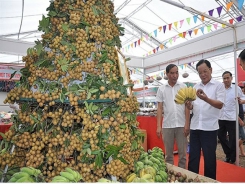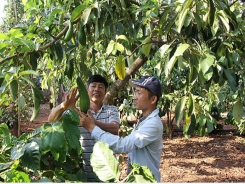Vietnams premium beans exported abroad, while local coffee quality remains poor

Vietnam exports nearly 2 million tons of high-quality coffee beans each year and imports 60,000 tons of processed coffee from Brazil, the US and China.
Vietnam is the second biggest coffee exporter
Being the second biggest coffee exporter in the world, Vietnam remains an unknown brand in the world’s coffee map. Ninety percent of its exports are raw materials.
Nguyen Van Thu, the owner of a café in district 3, HCMC, commented that customers need to blame themselves for the existence of low-quality coffee products in the market.
Many Vietnamese have special tastes. When drinking coffee, they want additives to make coffee flavor strong and fatty. To satisfy customers, suppliers add additives, butter, soybeans or maize powder during the roasting process. Coffee with additives is more familiar to Vietnamese.
Many Vietnamese have special tastes. When drinking coffee, they want additives to make coffee flavor strong and fatty. To satisfy customers, suppliers add additives, butter, soybeans or maize powder during the roasting process. Coffee with additives is more familiar to Vietnamese.
Some coffee exporters said foreigners are surprised about the coffee taste of the Vietnamese. The coffee products are mostly mixed with many aromatic spices and additives.
However, experts pointed out that the major reason behind this is the short supply of quality coffee. Vietnamese farmers collect the best coffee beans for export, and reserve lower-quality coffee for domestic sales.
Businesses also prefer exporting raw coffee beans, which allows them to take back investment capital quickly, rather than processing coffee to serve the domestic market.
The Q3 2017 report of BMI Research about Vietnam’s agriculture showed that in 2005-2015, the coffee consumption per head increased from 0.43 kilograms per annum to 1.38 kilograms.
This was the highest growth rate among coffee exporters and the figure is expected to rise to 2.6 kilograms by 2021.
The report also showed an increase in the consumption of roasted coffee in the 2017-2018 crop, estimated at 2.55 million, thanks to the rapid development of many coffee shops. This is a great opportunity for big companies to conquer the home market and provide high-quality genuine coffee to drinkers.
While foreign investors see Vietnam as a lucrative market and have stepped up investment in roasting workshops here, Vietnamese companies prefer exporting coffee to sell domestically.
While some businesses export best coffee beans, other businesses import processed coffee for domestic sale.
The same thing is also occurring with seafood and other farm produce. Nguyen Lam Vien, chair of Vinamit, a dried fruit producer, admitted that 80 percent of the company’s products are exported.
Duong Ngoc Minh, chair of Hung Vuong Seafood, has called on agricultural companies to focus on the domestic market.
“Vietnam is a vast market with 90 million consumers. Why do we ignore it and try to look for new risky markets?” he asked.
Related news
Tools

Phối trộn thức ăn chăn nuôi

Pha dung dịch thủy canh

Định mức cho tôm ăn

Phối trộn phân bón NPK

Xác định tỷ lệ tôm sống

Chuyển đổi đơn vị phân bón

Xác định công suất sục khí

Chuyển đổi đơn vị tôm

Tính diện tích nhà kính

Tính thể tích ao



 VN sees rice export growth by year-end
VN sees rice export growth by year-end  Central Highlands provinces urged to expand avocado farming
Central Highlands provinces urged to expand avocado farming